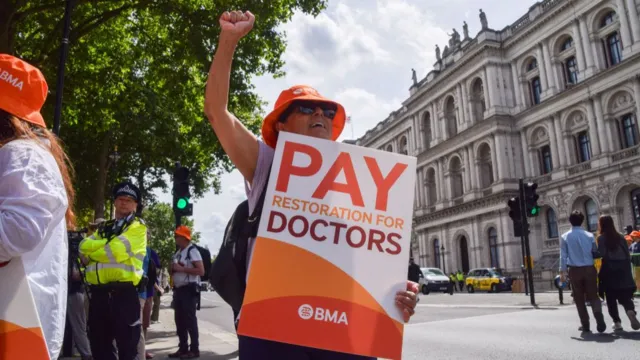Urgent Talks: Health Secretary and BMA Meet to Avert July NHS Strikes
In a critical move to prevent further disruption within England’s National Health Service (NHS), Health Secretary Wes Streeting is set to meet with representatives from the British Medical Association (BMA) next week. The high-stakes negotiations aim to de-escalate a brewing conflict over pay that has led to planned strike action by resident doctors.
The BMA recently announced that its members, formerly known as junior doctors, plan to undertake a five-day strike, commencing on July 25th and concluding on July 30th. This industrial action is a direct result of an ongoing pay dispute with the government. The BMA has stipulated that the strikes will only be called off if the upcoming negotiations yield an offer acceptable to its members.
The government, however, maintains that it is unable to improve upon the current offer, which includes a 5.4% pay increase for the current financial year. This offer is set to be reflected in pay packets starting in August. While this follows a significant 22% pay increase over the preceding two years, the BMA argues that the real-terms value of doctors’ pay has diminished by approximately 20% since 2008. They are seeking a clear commitment from the government to restore this value.
Sources within the Health Department suggest that while the Health Secretary is reportedly sympathetic to the challenges faced by resident doctors and acknowledges the need for improved working conditions, he remains firm on the salary offer. Following the BMA’s strike announcement, Mr. Streeting characterized the planned action as “unnecessary and unreasonable,” questioning the timing and impact on the NHS, which he described as “hanging by a thread.” He emphasized the government’s willingness to collaborate with the BMA but warned that further strikes would be detrimental to patient care and could undermine progress in reducing NHS waiting lists.
Co-chairs of the BMA’s resident doctor committee, Dr. Melissa Ryan and Dr. Ross Nieuwoudt, stated that their members felt compelled to strike due to the absence of a “credible offer to keep us on the path to restore our pay.” This sentiment underscores the deep dissatisfaction among medical professionals regarding compensation and its impact on their ability to remain in the public healthcare system.
The planned strikes come at a time when the NHS is facing considerable pressure. The dispute has also seen notable figures express concern, with Professor Lord Robert Winston, a renowned fertility expert, resigning from the BMA over the planned industrial action. He voiced his opinion that such strikes could erode public trust in the medical profession.
Resident doctors in England have previously engaged in significant strike action, participating in 11 separate walkouts between 2023 and 2024. The resolution of previous disputes, including the incoming Labour government’s agreement on a backdated increase, highlights the complex and persistent nature of these negotiations. It is important to note that the planned strikes in England do not impact resident doctors in Scotland, Wales, or Northern Ireland, as their pay negotiations are handled by their respective devolved governments.
Currently, the basic annual salaries for resident doctors in England range from approximately £37,000 to £70,000, depending on their level of experience. These figures do not include additional payments often associated with unsociable hours, such as night shifts and weekend work, nor do they incorporate the recently offered 5.4% pay increase slated to begin in August.

